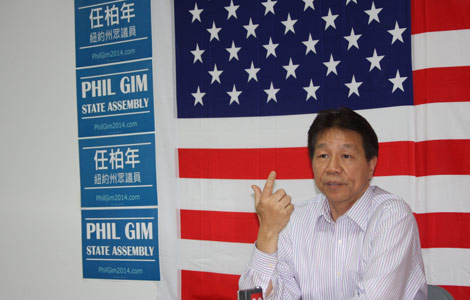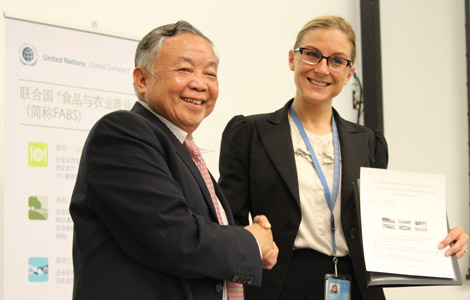US sends wrong message on China
Updated: 2014-06-12 12:06
By Pu Zhendong in Beijing (China Daily USA)
|
||||||||
China's normal defense development is being viewed in Washington through the prism of the Cold War, whereas the United States has been undermining regional peace and stability with its pivot to Asia, defense officials and analysts said on Wednesday.
In an online statement, Defense Ministry spokesman Geng Yansheng criticized a Pentagon report released last week that claimed China was "preparing for contingencies" in surrounding waters.
Geng said the report is a continuation of Washington's hype of a "China military threat", and the US, using zero-sum thinking, is seeking unilateral security.
"The United States was making irresponsible accusations against China on issues such as Taiwan, cybersecurity and the Air Defense Identification Zone in the East China Sea," Geng said.
The 96-page report, Military and Security Developments Involving the People's Republic of China for 2014, said China is modernizing its military capability to prepare for what the paper called "short-duration, high-intensity contingencies" in the South and East China seas.
"The US has conducted frequent joint drills targeting certain countries in the region and kept sending the wrong signals on issues of territorial disputes," Geng said.
The Pentagon report also said China's military spending exceeded $145 billion last year as it advanced a program that modernizes an arsenal of drones, warships, jets, missiles and cyberweapons, and the figure is 21 percent above the $119.5 billion China announced previously.
But Geng said Washington has double standards, as the US spends many times China's military budget every year on developing advanced weapons and building offensive cyberwarefare capabilities.
According to a report from the London-based International Institute for Strategic Studies, the US defense budget, the world's largest, soared from $287 billion in 2001 to $600.4 billion last year.
The US report also targeted the Chinese army's reconnaissance satellites, the anti-access/area-denial capabilities and use of low-observable technology and cyberwarfare.
Su Hao, director of the Center for Strategic and Conflict Management at China Foreign Affairs University, said: "The report is a result of the Pentagon's usual practice of perceiving China as an opponent as it described explicitly China's military conditions in 96 pages and spread it to the world."
"However, saying China is belligerently preparing for 'contingencies' simply does not conform to the facts," Su said.
The report said Washington will continue to "monitor China's evolving military strategy, doctrine, and force development, and encourage China to be more transparent about its military modernization program" as the country builds a stronger foundation for a military-to-military relationship with China.
Li Haidong, a US studies researcher at China Foreign Affairs University in Beijing, said: "The narrative on cooperation in the report shows Washington's flexibility in terms of Sino-US military ties, but cooperation cannot be built on suspicion."
China and the US have had more military exchanges in the last two years, but they have been overshadowed by the recent US Justice Department's indictment of five PLA officers for the alleged cybertheft of US corporate business secrets. China has denied the charges.
Geng said, "The indictment, the frequent criticism and the constant reconnaissance have sabotaged trust between the two countries, contrary to the trend of building a new type of military relations agreed to by our leaders."
The Pentagon report, submitted to the US Congress annually since 2000, has drawn repeated protests from China over its interfering nature, distortion of facts and baseless speculation.
Xinhua contributed to this story.
puzhendong@chinadaily.com.cn

 Forum trends: When my father was young
Forum trends: When my father was young
 Photographer puts Asian-Americans in 'Transcontinental' photo
Photographer puts Asian-Americans in 'Transcontinental' photo
 Zhaopin IPO raises $76m on NYSE
Zhaopin IPO raises $76m on NYSE
 US law firm awards fellowship to students in China
US law firm awards fellowship to students in China
 NYC museum to showcase Chinese-American history
NYC museum to showcase Chinese-American history
 School bill raises concerns
School bill raises concerns
 National security adviser defends US leadership role
National security adviser defends US leadership role
 Nonstop route links Chengdu and San Francisco
Nonstop route links Chengdu and San Francisco
Most Viewed
Editor's Picks

|

|

|

|

|

|
Today's Top News
Ambassador dismisses concern that China is threat to US
Blackwater guards on trial for 2007 shootings
Zhaopin IPO raises $76 m on NYSE
Pentagon report rejected as 'irresponsible'
Awards honor Chinatown leaders
US sends wrong message on China
US, China airline market heating up
Sino-US ties reach new plane as flights expand
US Weekly

|

|








